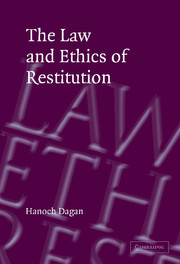Book contents
- Frontmatter
- Contents
- Acknowledgments
- Table of cases
- Table of statutes and treaties
- 1 Introduction
- 2 Preventing unjust enrichment
- 3 Mistakes
- 4 Other-regarding conferrals of benefits
- 5 Self-interested conferrals of benefits
- 6 Restitution in contexts of informal intimacy
- 7 Wrongful enrichments
- 8 Restitution in a contractual context
- 9 Restitution in bankruptcy
- 10 Reasons for restitution
- Bibliography
- Index
8 - Restitution in a contractual context
Published online by Cambridge University Press: 05 July 2009
- Frontmatter
- Contents
- Acknowledgments
- Table of cases
- Table of statutes and treaties
- 1 Introduction
- 2 Preventing unjust enrichment
- 3 Mistakes
- 4 Other-regarding conferrals of benefits
- 5 Self-interested conferrals of benefits
- 6 Restitution in contexts of informal intimacy
- 7 Wrongful enrichments
- 8 Restitution in a contractual context
- 9 Restitution in bankruptcy
- 10 Reasons for restitution
- Bibliography
- Index
Summary
The theme of this chapter is that restitution claims that arise in a contractual context should respect the contractual allocation of risks and benefits. Whether we think of such claims as based on the contract, or insist that they have an independent doctrinal source grounded in unjust enrichment, their analysis should not ignore the contractual setting in which these claims are situated. This prescription requires close attention to the facts of the case at hand that may point to certain explicit or implicit consensual allocations of risks and benefits. It also entails an inquiry into the best allocation of risks and benefits between contractual parties that law should prescribe absent a specific consensual opt out. Either way, an enrichment-based claim that is not attentive enough to the implications of the contractual background is likely at best to obscure the pertinent questions, and at worst to lead the doctrine astray.
The proposition that awards of restitution should be attentive to any contractual background is widely accepted in American law. There is less agreement as to the implications of this proposition, partly because of disagreements as to which values should guide law in prescribing contractual default rules. Most of the attention (and the disagreements) of courts and commentators focuses around three categories of restitution cases that involve a contractual context.
- Type
- Chapter
- Information
- The Law and Ethics of Restitution , pp. 260 - 296Publisher: Cambridge University PressPrint publication year: 2004



